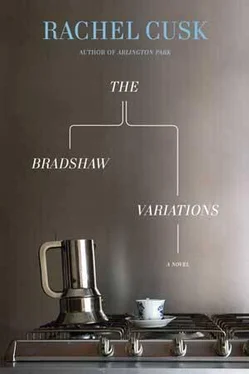Rachel Cusk
The Bradshaw Variations
What is art? Thomas Bradshaw asks himself this question frequently. He does not yet know the answer. He used to believe art was a kind of pretending, but he doesn’t think that any more. He uses the word authenticity to describe what he thinks now. Some things are artificial and some are authentic. It is easy to tell when something is artificial. The other is harder.
In the mornings he listens to music, to Bach or Schubert. He stands in the kitchen in his dressing gown. He waits for his wife and daughter to come downstairs. He is forty-one, the age when a life comes out of its own past like something out of a mould; and either it is solid, all of a piece, or it fails to hold its shape and disintegrates. The disintegration is not difficult to imagine. It is the solidity, the concrete form, that is mystifying. Disintegration does not involve questions of authenticity, but of a solid form the questions must be asked.
Mostly, in fact, it is the lodger Olga who comes down first. He hears her tread on the stairs and doesn’t recognise it: that is how, every day, he identifies her, by hearing her quiet, slightly plodding step and wondering who on earth it belongs to. She ducks her peroxided head at him, flashes her uncertain train-track smile. For six months now Olga has been embroiled in protracted dentistry. Beneath the metal braces her teeth are grey and disorderly. As a child her mother apparently never took her to the dentist. This was not out of neglect, Olga has told him. It was because Olga was frightened of going, and her mother couldn’t bear her to be frightened, or to feel pain. She has told Thomas that she is saving up for a bridge and a set of caps. She has three different jobs and all the money goes on her teeth. She complains of the expense: in Poland the cost of dentistry is much lower. There, she could have all the work done — ‘All!’ Olga repeats, making a chopping motion with her hand — for what she pays here for just one monthly visit.
These conversations do not entirely engage Thomas. When he talks to Olga he is both there and not there. He is waiting for Tonie to come down, as the platform guard waits for the London train to come through. Tonie’s appearances in the kitchen are brief. Like the train she stops, disgorging activity, and then departs again. It is a matter of minutes, but he needs to be ready. He hears Olga — in some ways he even identifies himself with her, both of them platform dwellers — but when she speaks he cannot reciprocate. He is as though sealed behind glass. He wonders if she realises this, realises that she can see but not touch him. She drinks tea from a giant Garfield mug and eats cereal, topping up the milk frequently from the plastic container that stands beside her bowl. He glimpses her bare, mushroom-coloured legs beneath the table, her feet clad in large soft slippers. He turns the music up a little: it is an offering, a form of explanation. He wants her to know that he is aware of his own limitations, of his failure to make anything of their conversations in the morning. Sometimes this failure appears to him as something intrinsic to time itself, as an inner force, like decay. They pass and are forgotten, these interludes in the kitchen. And yet they are always the same: he could stand here for a hundred years and still have much the same conversation with Olga. There are, it seems, limitless copies of this conversation, but it never goes anywhere or develops. By the same token, it never dies. It has no relationship to time. This may be because it lacks authenticity.
At seven thirty Tonie comes down and Olga goes up. Olga has a cleaning job at the hospital: her shift starts at eight. Tonie gets the seven-fifty train. It interests Thomas to see that while Olga’s priority is food, Tonie gives precedence to her appearance. She stays upstairs until the last possible minute, while Olga sits at the table for half an hour or more in her dressing gown, working at her mug and bowl. Upstairs doors bang, taps run, Tonie’s footsteps stalk to and fro. Olga gets up and slowly carries her dishes to the sink, her slippers dragging and hissing across the floor, and reties her dressing-gown cord before beginning her unhurried ascent to her room. Sometimes she and Tonie pass on the stairs and Tonie says, ‘Hi, Olga,’ in a voice that is half whisper, very deep and throaty, very exotic and distrait , as though she has just disentangled herself from a situation that is too complex and passionate to explain. ‘Hello!’ Olga replies, cheerful as a trumpet.
The stairs run through the core of the tall, narrow house and the treads are uncarpeted. The footsteps go up and down them like arpeggios up and down a keyboard. To Thomas the rooms at the top have a sweet, tinkling atmosphere, light-filled and harmonious. The kitchen, where he stands in his dressing gown, is in the basement. It is deep and sonorous: it underpins the melody of the house with its static, structural confirmations. Tonie does not like being in the kitchen. She is always carrying things on trays up to the higher regions. She has taken down the curtains to let in more light. Sometimes she cleans it, thoroughly and punitively, but her feelings do not change. Thomas, however, is happy down here. He likes the atmosphere of the bass clef, its fundamentality, its insistence on necessities. It is in the basement that he has begun to consider time, and its relationship to authenticity. It is here that he has discovered an underlying structure, a plan. Often he doesn’t change out of his dressing gown until eleven or twelve o’clock. By then he is finished with the revelations of the bass clef. He turns off his music. He is ready to read. Reading, he admits, has to be done on a sofa, upstairs.
Tonie eats, drinks coffee, standing up at the counter. She wears bracelets that rattle when she lifts her cup to her lips and glances at her watch. She has, he thinks, an atmosphere of quest about her, of honour. She will join the seven-fifty as the soldier joins his departing regiment. She will not think about him all day; she will not think about Alexa, nor about the sun moving in golden panels across the floorboards of their room, the clock ticking in the hall, the sounds of cars and voices that drift in from the street and then vanish, the day passing through the house, passing irretrievably through its core, its very fibres. She will be valiant not to think about these things, but she will derive, he knows, a rudimentary pleasure from it too. It is the pleasure of self: Thomas knows because he has felt it himself. Once it was he who stood there, clean, bright-eyed, dressed for departure, and Tonie who remained behind to witness the day’s passage. Did she wear a dressing gown? He isn’t sure. He can’t recall what she looked like when he was leaving her. She was part of a pattern, like a figure in a tapestry, woven into her setting.
She puts things into her bag. She says something, but the music is so loud that she has to repeat it, raising her voice. It is Schubert’s Fantasiestücke . She says,
‘I’ve got a meeting. I won’t be back before eight.’
‘Okay,’ he says loudly. ‘Fine.’
He goes to turn the music down but it is too late. She has swung her bag over her shoulder and is moving towards the stairs.
*
Alexa is still asleep. She lies in her bed like a girl in a fairy tale. In sleep she is very soft. She exudes something, a kind of mist, as though when she sleeps she sets aside her solidity and takes on the transmutable properties of light and liquid and air. Thomas doesn’t want to dwell too much on his daughter’s beauty. He looks at her but he can give no name to his looking, no motive. He would like an artist to paint her. It would be easier to look at a painting of Alexa than at Alexa herself.
Читать дальше












